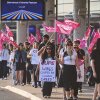
This combination photo shows presidential candidates Rodrigo Paz, left and Bolivia’s former President Jorge Quiroga, right. Freddy Barragan, Arnulfo Franco/AP hide caption
toggle caption
Freddy Barragan, Arnulfo Franco/AP
LA PAZ, Bolivia — Bolivia’s presidential vote headed to an unprecedented runoff after a vote Sunday that ended more than two decades of left-wing dominance in the Andean nation but signaled voters’ trepidation about a major lurch to the right.

Business
Government forces Air Canada flight attendants back to work, into arbitration
A dark horse centrist, Sen. Rodrigo Paz, drew more votes than the right-wing front-runners, although not enough to secure an outright victory, early results showed.
Paz, a former mayor who has sought to soften the edges of the opposition’s push for tough austerity to rescue Bolivia from economic collapse, will face off against right-wing former President Jorge “Tuto” Quiroga, who finished second. Bolivia will hold the second round — its first presidential runoff since its 1982 return to democracy — on Oct. 19.
“Always Bolivia, everything for Bolivia,” Paz declared to cheering crowds. “This economic model must change.”
With over 91% of the ballots counted Sunday, Paz received 32.8% of the votes cast. Quiroga secured 26.4%. Candidates needed to surpass 50%, or 40% with a 10-point margin of victory, to avoid a runoff.
Addressing fans and flanked by family, Quiroga congratulated Paz on his lead.
“What happened is unprecedented. Bolivia told the world that we want to live in a free nation,” he said. “It’s a historic night.”
A leftist establishment confronts its demise
The results delivered a major blow to Bolivia’s hegemonic Movement Toward Socialism, or MAS, party, which has governed Bolivia almost uninterrupted since its founder, charismatic ex-President Evo Morales, rose to power as part of the “pink tide” of leftist leaders that swept into office across Latin America during the commodities boom of the early 2000s.
The official MAS candidate, Eduardo del Castillo, finished sixth with just 3.2% of the vote. The other leftist candidate considered to be the party’s best hope, 36-year-old Senate president Andrónico Rodríguez, captured 8% of the vote.
During his almost 14 years in power, Morales expanded the rights of the country’s Indigenous majority, defended coca growers against U.S.-backed eradication programs and poured natural gas profits into social programs and infrastructure.
But the maverick leader’s increasingly high-handed attempts to prolong his presidency — along with allegations of sexual relations with underage girls — soured public opinion against him.
Simmering discontent turned into a tidal wave of anger at the MAS party as Bolivia’s once-stable economy imploded under Morales’ protégé-turned-rival, President Luis Arce.

Weather
Category 4 Hurricane Erin moves past northern Caribbean islands
Annual inflation rate has soared from 2% less than two years ago to over 16% as of last month. A scarcity of fuel has paralyzed the country. A desperate shortage of U.S. dollars needed to pay for essential imports like wheat has crippled the economy.
As the crisis accelerated, MAS leaders traded blame. A power struggle between Morales and Arce ultimately fractured the party and handed the opposition a real shot at victory even as its uncharismatic candidates failed to unite.
A centrist takes a surprise lead
The win for Paz came as a shock to a nation that had been conditioned by weeks of opinion polls to expect that the leading right-wing contenders, Quiroga and businessman Samuel Doria Medina, would capture the top two spots.
Sunday marked Doria Medina’s fourth failed presidential bid. He told grim-faced supporters that he had “no regrets.”
“I wanted to serve Bolivia as president, and it hasn’t been possible,” he said.
The elevation of the more moderate Paz apparently reflects Bolivian ambivalence about a dramatic veer to the right.
Paz has sought to distance himself from pledges by Quiroga and Doria Medina to sell Bolivia’s abundant lithium reserves to foreign companies and turn to the International Monetary Fund for billions of dollars of loans.
But he has also launched blistering attacks on the MAS party and its state-directed economic policies.
“I want to congratulate the people because this is a sign of change,” Paz said. “They want a different future.”
New face, old roots
Despite their grand promises for drastic change, Doria Medina and Quiroga struggled to stir up voter excitement.
Bolivians associate them both with the U.S.-backed neoliberal administrations that Morales repudiated when he stormed to office in 2006, famously declaring an end to Bolivia’s 20-year experiment with free-market capitalism.
Now, after 20 years of Morales’ populist, state-directed economic policies, Bolivia faces a return to belt-tightening. After years of alignment with world powers like China and Russia, Bolivia seems set to reconcile with the United States.

The Americas
Category 4 Hurricane Erin moves past northern Caribbean islands
Paz supporters have described the former mayor of the southern town of Tarija as a fresh face with new ideas. But he, too, has deep ties to Bolivia’s old political elite.
The 57-year-old lawmaker is the son of former President Jaime Paz Zamora, who began his political career as a committed leftist and co-founded the Revolutionary Left Movement. He and his colleagues were targeted and persecuted under the bloody military dictatorship of Hugo Banzer in the 1970s. Paz was born in exile in Spain during Banzer’s dictatorship.
But in a dramatic turn, Paz Zamora later struck a pact with Banzer’s right-wing party and managed to serve as president from 1989 to 1993. Doria Medina served as his minister of planning.












